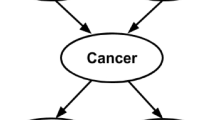Abstract
A new algorithm, PCB (Partial Correlation-Based) algorithm, is presented for Bayesian network structure learning. The algorithm combines ideas from local learning with partial correlation techniques in an effective way. It reconstructs the skeleton of a Bayesian network based on partial correlation and then performs greedy hill-climbing search to orient the edges. Specifically, we make three contributions. Firstly, we give the proof that in a SEM (simultaneous equation model) with uncorrelated errors, when datasets are generated by SEM no matter what distribution disturbances subject to, we can use partial correlation as the criterion of CI test. Second, we have done a series of experiments to find the best threshold value of partial correlation. Finally, we show how partial relation can be used in Bayesian network structure learning under SEM. The effectiveness of the method is compared with current state of the art methods on 8 networks. Simulation shows that PCB algorithm outperforms existing algorithms in both accuracy and run time.
Access this chapter
Tax calculation will be finalised at checkout
Purchases are for personal use only
Preview
Unable to display preview. Download preview PDF.
Similar content being viewed by others
References
Cheng, J., Greiner, R., Kelly, J., Bell, D.A., Liu, W.: Learning Bayesian networks from data: An information-theory based approach. Doctoral Dissertation. Department of Computing Science, University of Alberta and Faculty of Informatics, University of Ulster, November 1 (2001)
Chickering, D.: Learning Bayesian networks is NP-Complete. In: AI/Stats V (1996)
Cooper, G.F., Herskovits, E.: A Bayesian method for the induction of probabilistic networks from data. Machine Learning 9(4), 309–347 (1992)
Friedman, N., Nachman, I., Peer, D.: Learning Bayesian network structure from massive datasets: The ”sparse candidate” algorithm. In: UAI (1999)
Kleijnena, J.P.C., Heltonb, J.C.: Statistical analyses of scatterplots to identify important factors in largescale simulations, 1: Review and comparison of techniques. Reliability Engineering and System Safety 65, 147–185 (1999)
Lam, W., Bacchus, F.: Learning Bayesian belief networks: An approach based on the MDL principle. Comp. Int. 10, 269–293 (1994)
Schmidt, M., Niculescu-Mizil, A., Murphy, K.: Learning Graphical Model Structure Using L1-Regularization Paths. In: Proceedings of Association for the Advancement of Artificial Intelligence (AAAI), pp. 1278–1283 (2007)
Ogawa, T., Shimada, M., Ishida, H.: Relation of stiffness parameter b to carotid arteriosclerosis and silent cerebral infarction in patients on chronic hemodialysis. Int. Urol. Nephrol. 41, 739–745 (2009)
Pellet, J.P., Elisseeff, A.: Partial Correlation and Regression-Based Approaches to Causal Structure Learning, IBM Research Technical Report (2007)
Pellet, J.P., Elisseeff, A.: Using Markov Blankets for Causal Structure Learning. Journal of Machine Learning Research 9, 1295–1342 (2008)
Rissanen, J.: Stochastic complexity. Journal of the Royal Statistical Society, Series B 49, 223–239 (1987)
Scheines, R., Spirtes, P., Glymour, C., Meek, C., Richardson, T.: The tetrad project: Constraint based aids to causal model specification. Technical report, Carnegie Mellon University, Dpt. of Philosophy (1995)
Spirtes, P., Glymour, C., Scheines, R.: Causation, prediction, and search, 2nd edn. The MIT Press, Cambridge (2000)
Sun, Y., Negishi, M.: Measuring the relationships among university, industry and other sectors in Japan’s national innovation system: a comparison of new approaches with mutual information indicators. Scientometrics 82, 677–685 (2010)
Tsamardinos, I., Brown, L., Aliferis, C.: The max-min hill-climbing bayesian network structure learning algorithm. Machine Learning 65, 31–78 (2006)
Xu, G.R., Wan, W.X., Ning, B.Q.: Applying partial correlation method to analyzing the correlation between ionospheric NmF2 and height of isobaric level in the lower atmosphere. Chinese Science Bulletin 52(17), 2413–2419 (2007)
Author information
Authors and Affiliations
Editor information
Editors and Affiliations
Rights and permissions
Copyright information
© 2011 Springer-Verlag Berlin Heidelberg
About this paper
Cite this paper
Yang, J., Li, L. (2011). A Partial Correlation-Based Bayesian Network Structure Learning Algorithm under SEM. In: Huang, J.Z., Cao, L., Srivastava, J. (eds) Advances in Knowledge Discovery and Data Mining. PAKDD 2011. Lecture Notes in Computer Science(), vol 6635. Springer, Berlin, Heidelberg. https://doi.org/10.1007/978-3-642-20847-8_6
Download citation
DOI: https://doi.org/10.1007/978-3-642-20847-8_6
Publisher Name: Springer, Berlin, Heidelberg
Print ISBN: 978-3-642-20846-1
Online ISBN: 978-3-642-20847-8
eBook Packages: Computer ScienceComputer Science (R0)




